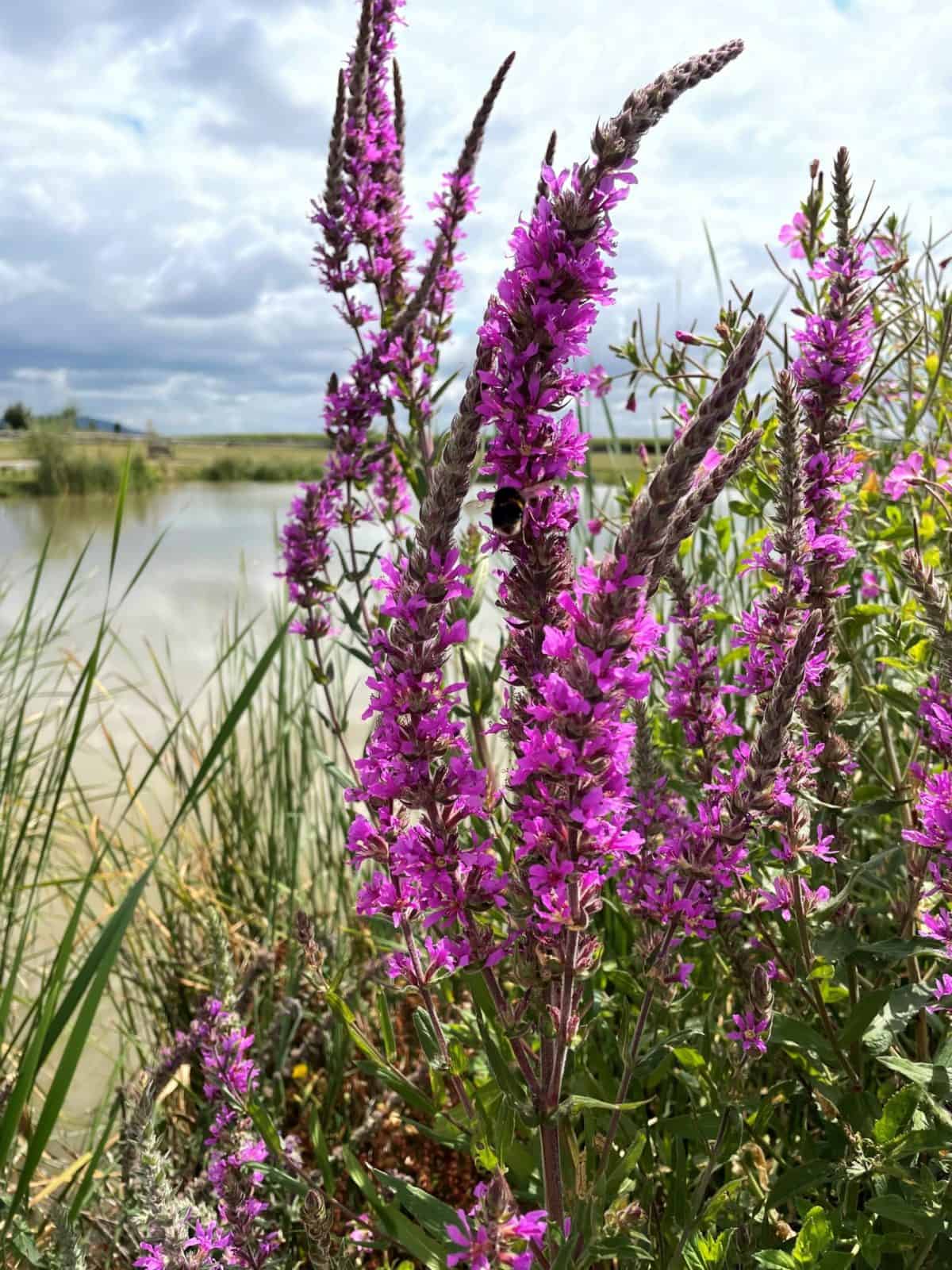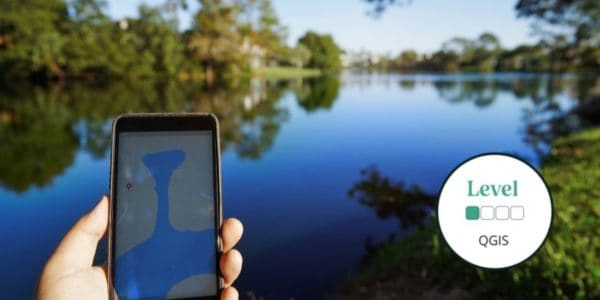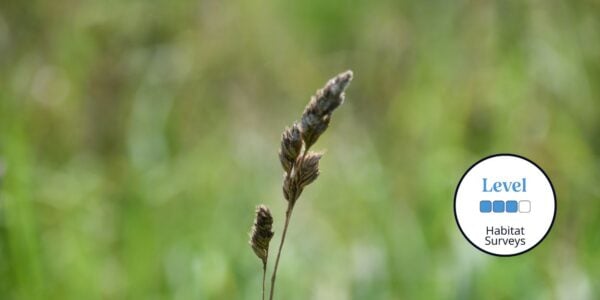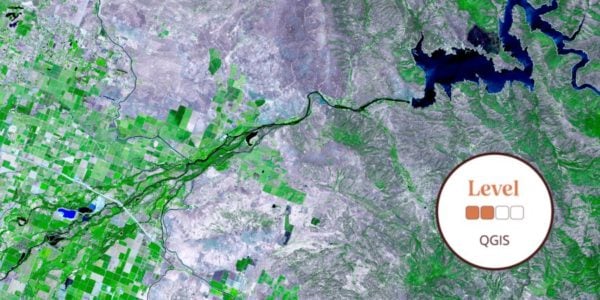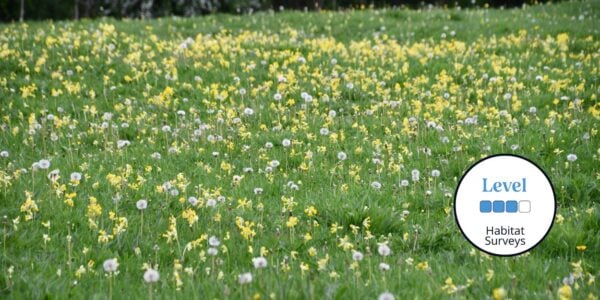This course is now fully booked.
Sign up for our newsletter to hear about the next run of this course
Find similar courses here
This course provides an introduction to, and practical field experience in, using Phase 1 Habitat Surveys, the standard method of assessing and recording wildlife habitats and sites.
This course allows learners to gain an understanding of the techniques involved in undertaking a Phase 1 Habitat Survey. Anyone needing to carry out ecological surveys in relation to planning and development, or site conservation and management, will find this course covers the essential techniques. Working with fellow participants you will learn how to survey a site, identifying the different habitats present and then producing a map and description of the site. Further days will be spent in a variety of habitats to see how to classify them.
The Phase 1 habitat classification and field survey technique provides a comparatively rapid system of classifying and recording semi-natural vegetation and other wildlife habitats. As a system it is widely established within the ecological industry and often provides the baseline for any potential development or change in management for a site, as well as allowing finite conservation/development resources to be allocated sustainably.
You will spend your course amidst the quintessentially English countryside of the Dedham Vale in Suffolk situated on the banks of the River Stour.
PLEASE NOTE the course fee is for tuition only. If you would like to book accommodation and meals, including packed lunches, at Flatford Mill please email [email protected] Please book early to ensure availability of accommodation.
Who Should Attend?
Natural history enthusiasts, students, rangers, ecologists, environmental professionals. This intermediate level course is open to anyone with some knowledge of the subject.
Knowledge Level – Intermediate. Level descriptors can be found on the following webpage: Framework and Course Level Descriptors
What will be covered during this course?
The course will be delivered through a combination of seminars, laboratory identification sessions and practical field work.
Practical fieldwork skills will be taught to aid correct categorisation of habitats according to the standard methodology and allowing production of justified mapping decisions. Target Notes are an important aspect of Phase 1 fieldwork, and demonstration of producing them so that they can be used to illustrate habitats or features of a site appropriately. Other techniques including Ellenberg Values will be shown alongside the standard methodology to help illustrate how complex habitats may be described accurately.
To aid the students understanding of the Phase One technique, the need for and history behind Phase 1 Surveys as well as how it fits alongside other phytosociological and ecological descriptions will be considered. Its place within modern ecological conservation and development policy will be illustrated.
Whilst Phase 1 Habitat Surveys are widely used in conservation and development, they do have there issues, particularly with repeatability, inaccuracies in mapping and classifying habitats. The technique is critiqued to help the student rectify many of these issues, and design strategies to reduce the impact and/or prevent them occurring. Evaluation of past surveys and data will form part of the course, allowing students to critically interpret existing Phase 1 surveys. Historical evidence will be reviewed for a site, and students will learn to discriminate the important species/habitats contained within these searches, and how they might influence recording on the site.
Best practice in the collection of biological recording data in connection with Phase 1 Habitat Surveys will be taught. Phase 1 Habitat Survey skills and disseminating the results of these surveys are a key area of employability for students undertaking the Biological Recording course.
By the end of the course, you will be able to:
- Demonstrate the ability to carry out a Phase 1 Habitat survey of a complex UK habitat.
- Analyse the findings of a Phase 1 Habitat survey and report on the findings, distinguishing those species/habitats of conservation value and justifying mapping/habitat identification decisions.
Accreditation
This is one of a series of courses (Units) run jointly with Manchester Metropolitan University contributing to the MSc Biological Recording and Ecological Monitoring and the Postgraduate Certificate in Biological Recording. MMU students complete assessed work after the course. For further details about Manchester Metropolitan University degree programmes please contact:
Department of Natural Sciences, Manchester Metropolitan University, (Shrewsbury Office). Email: [email protected]
- See the ‘Example Timetable’ and ‘What’s Included’ sections below for more information about this course.
- Upon booking you will need to provide individual details of all attendees
- Please email [email protected] if you have any questions
Assessment
For Manchester Metropolitan University students, the Unit will be assessed through, for example, identification tests, survey reports, field journals, production of keys, essays or other forms of assessment. In course tests are optional and less formal for participants who are not MMU students.
MMU students will be required to complete a Phase One survey report.
During the course, students will visit a field site and be required to undertake a Phase 1 Habitat Survey. Mapping and identification of habitats will be completed. From this information a report suitable for either a planning or conservation organisation will be produced following the format of an Ecological Report (following CIEEM guidelines). The report should contain Target Notes, Habitat Maps and descriptions of vegetation encountered. Students will be assessed on their ability to identify and differentiate between similar habitats, assess the quality of those habitats encountered, any protection(s) they might have, threats to these habitats and their suitability for wildlife. Finishing with an evaluation and justification on the ecological value of the site. (2000 words)
Tutor: Alanna Cooper
Alanna Cooper is a botanist and is principal ecologist at a local environmental and engineering consultancy. She has experience of botanical survey work and habitat management in both Canada and the UK for a diverse variety of habitats. She is actively involved in the Wildflower Society and BSBI and is convenor for the CIEEM East of England committee.Book with Confidence
We understand the difficulties of making plans in the current situation when guidelines continue to change, and insurance conditions are being tightened. In response, we will continue to offer additional flexibility. Find out more here
Example Timetable
Example Timetable
This timetable is subject to change but should give an outline of what to expect.
If you have booked accommodation and meals with the centre your bedroom will be ready from 3.00 pm onwards on the day of arrival and we ask that you vacate by 9.30 am on the morning of departure.
If numbers are sufficient a station pick up will be arranged at 5.30 pm from Shrewsbury Station.
The evening meal is at 6.30 pm (not included in the course fee - please book separately).
The course starts after dinner with a classroom session 7.30 pm - 9.00 pm
The course ends at 4.00 pm on the final day.
Time will be made available for eating packed lunches during the day (not included in the course fee - please book separately).
Friday evening
Introduction to Phase 1 Survey methodology.
Saturday
Field survey: Planning a Phase 1 Survey and mapping techniques. Undertake a Phase 1 habitat survey of a local site (grassland and woodland).
Evening Classroom: Production of the days survey maps along with target notes and dominant species codes.
Sunday
Undertake a Phase 1 habitat survey of a local site (moorland and associated habitats).
Evening classroom: Learn about freely available online mapping resources. Discuss how Ellenberg values can be used to help distinguish closely related habitats. Discuss problems with the Phase 1 methodology and assess ways to control for them. Look at developing identification skills for assisting with Phase 1 surveys.
Monday
Visit another site to undertake a Phase 1 Survey working in small groups. For MMU credit students the data from this survey will form part of their assessment. For non-credit students you can gain further experience of undertaking Phase 1 surveys with help from the tutor.
What's Included
What’s included?
- Classroom learning covering the theory of the subject
- Field excursions to apply new knowledge
- Expert tuition for which the FSC is renowned
- Clear objectives and progression
You can rest assured that the absolute best content from an expert in environmental education will be provided. In choosing an FSC course, you will be joining thousands of people who learn with us each year.
PLEASE NOTE the course fee is for tuition and refreshments only. If you would like to book accommodation and meals, including packed lunches, at FSC Flatford Mill please email [email protected] Please book early to ensure availability of accommodation.
Before You Attend
There will be a member of staff with first aid training and access to a first aid kit on site. If you have special medical or access requirements, please let us know as soon as possible so we can make any necessary adjustments.
What to Bring
- A clipboard (weather writer preferably), notebook, pencil and pens.
- Hand lens (x10 and/or x20).
- Pen drive (USB Flash drive) for taking away electronic resources.
- Field work clothes - we may get wet as fieldwork will continue in the rain!
- Sun hat and sun block, warm hat and gloves – the weather can be very variable in the hills.
- Waterproof jacket and waterproof trousers (can be borrowed from the Centre).
- Outdoor footwear (walking boots and wellies can be borrowed from the Centre).
- Water bottle and lunch box (and thermos flask if required).
- Day rucksack.
- A torch.
- We will provide specialist equipment, but if you have your own you are welcome to bring it.
Useful Books
- Handbook for Phase 1 survey. 2007. JNCC. Available freely on the JNCC website.
- The Vegetative Key to the British Flora. 2010. Poland, J. & Clement, E.J.
- The Wildflower Key. 2006. Rose, F. & O’Reilly, C.
- The New Flora of the British Isles. 1997 or 2010. Stace, C.A.Field flora of the British Isles. 2005. Stace, CUP
- FSC Foldout chart: Plant identification for Phase I habitat survey, grassland and marsh. 2016. Wallace and Duffell.
- FSC Foldout chart: Plant identification for Phase I habitat survey, Heaths and Mires. 2017. Wallace and Duffell.
Sorry this course has ended

